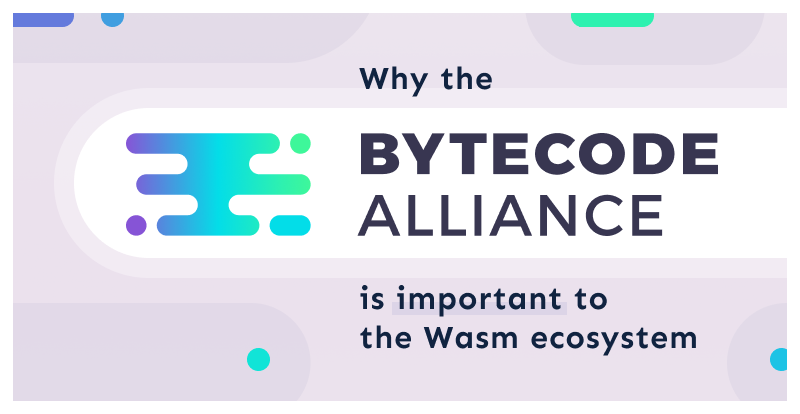Why the Bytecode Alliance is important to the Wasm ecosystem
 James Bohrman
James Bohrman
webassembly
wasm
wagi
rust

In the early stages of any technical innovation, projects are often heavily fragmented and lack a clearly defined body of standards that organizes proposals and navigates the larger discussion. In the growing WebAssembly world, a non-profit organization called the Bytecode Alliance is attempting to address this concern by providing a cross-industry standardization body for the Wasm ecosystem.
What is the goal of Bytecode Alliance?
The Bytecode Alliance is a standards-sharing organization that is committed to advancing innovation within the WebAssembly ecosystem and providing a foundation for cross-industry standards. The organization hopes to address some of the fundamental issues of modern software development practices by providing a solid foundation for interoperable software deployment.
With the emerging standards in the WebAssembly ecosystem, this foundation is beginning to take shape.
How can standards help create better software?
Standards are important to developing more interoperable software and key to addressing some of the fundamental issues of modern software development. To allow for safe reuse of code across various deployment methods, it is important to address standards that enable the safe and secure deployment of code across multiple systems.
This is why standards-sharing organizations like Bytecode Alliance are important in fostering innovation in new ecosystems.
How Bytecode Alliance can make WebAssembly better
As applications become increasingly more modular, developers are being required to run untrusted code in many new places. This modularity indroduces a litany of security concerns, as seen in the fact that software supply chain attacks grew by 650% in 2021.
While it would be ideal if we could trust all of the dependencies in our code by default, the truth is that when much of the code base comes from package registries like npm, PyPI, and crates.io, it is hard to know for sure how safe the code actually is.
The WebAssembly ecosystem could provide a decent solution here if implemented in a way it is secure by default. However, if the ecosystem fails to implement it in a secure-by-default fashion, then WebAssembly could make the problem even worse.
This is why a cross-industry standards-sharing organization like the Bytecode Alliance is so important. By having members from across industry collborate on and share standards, it fosters innovation and improves the overall security of the WebAssembly ecosystem.
Becoming a Member
Any organization eager to support and contribute to projects within Bytecode Alliance are also encouraged to apply as members. You will be joining leading vendors, partners, and enterprises in a cross-industry collaborative mission to create a secure, performant, cross-platform and cross-device future of computing.
Contributing to Bytecode Alliance
If you’re a developer and would like to contribute to a Bytecode Allience project (cough Fermyon maybe? cough) then you’re encouraged to participate in any open source project in the Bytecode Alliance. Each project is governed by its own committer group. Developers who are very active in shaping a project are eligible for nomination to the project’s committer group.